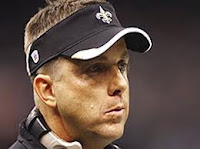 |
| Saints coach Sean Payton |
I can recall several NFL players in recent years whose actions have resulted in suspensions, but the sidelining of a coach, or the off-the-sidelining more accurately, is far less common.
As in other professional sports, you don't have to look far in professional football to find occasions where players have been benched for incidents related to the use of performance enhancing drugs or off-the-field behavior that violates the NFL's personal conduct policy. In football, there are also plenty of examples of players who have been suspended for unacceptable or dangerous on-the-field conduct. The egregious head-stomping incidences involving Ndamukong Suh and Albert Haynesworth both come to mind, although even those only resulted in 3 and 5 game suspensions, respectively.
But do NFL coaches get suspended?
There was the much-publicized Bill Belichick SpyGate scandal a few years ago, wherein the hoodied leader of the Patriots was held accountable for videotaping another team's defensive signals in violation of league rules. The incident cost Belichick $500,000 and it cost the Patriots an additional $250,000 plus a first-round draft pick, but there were no NFL-imposed suspensions.
Former Minnesota Viking's head coach Mike Tice scalped a pair of Super Bowl tickets and received a $100,000 fine as a result. Jeff Fisher, formerly the head coach of the Tennessee Titans, has been penalized for his vocal criticism of game officials and referees - and the punitive response from the NFL for Fisher, and several others who have committed the same offense, has always been to pay a fine for their remarks.
That said, there have been a few recent coaching suspensions in the NFL.
Notably, Sal Alosi, a NY Jets strength and conditioning coach, was suspended indefinitely by the Jets organization in 2010 for instructing players on the sideline to trip a Miami Dolphin punt returner. The Jets were also fined $100,000 by the league for the incident. And there was Wade Wilson, a Cowboys assistant coach, who was fined and suspended for five games by the NFL for buying and using performance enhancing drugs in 2007. Still, while there have been some coaching suspensions, the levying of fines is a far more typical punishment for NFL coaches who find themselves in hot water with the league.
That's why when I first read the headlines about the Saints "bounty" program and saw that Sean Payton had been suspended for one full year from football, I wondered if NFL Commissioner Roger Goodell had grossly overreacted.
Once I learned the details of the bounty program though, I saw that something far more sinister and nefarious than I originally imagined had been going on in New Orleans.
I now believe the punishment fits the crime.
Below are some of the most egregious specifics reported by the NFL about the Saints bounty program. You can read the full conclusive findings of the investigation here.
- "The Saints defensive team operated a pay-for-performance/bounty program, primarily funded by players, during the 2009, 2010, and 2011 seasons. Under that program, players regularly made cash donations to a pool, and were "fined" for mental errors, loafing, penalties, and the like. At least one assistant coach (defensive coordinator Gregg Williams) occasionally contributed to the pool."
- "Payments also were made for plays on which opposing players were injured. In addition, specific players were sometimes targeted. The investigation showed bounties being placed on four quarterbacks of opposing teams - Brett Favre, Cam Newton, Aaron Rodgers, and Kurt Warner."
- "Multiple sources have confirmed that several players pledged funds toward bounties on specific opposing players, with defensive captain Jonathan Vilma offering $10,000 to any player who knocked Brett Favre out of the NFC Championship Game in 2010."
- "Coach Williams acknowledged that he designed and implemented the program with the assistance of certain defensive players. He said that he did so after being told by Saints Head Coach Sean Payton that his assignment was to make the defense "nasty."
- "When interviewed in 2012, Sean Payton claimed to be entirely unaware of the program, a claim contradicted by others. Further, prior to the Saints' opening game in 2011, Coach Payton received an email from a close associate that stated in part, "PS Greg Williams put me down for $5000 on Rogers (sic)." When shown the email during the course of the investigation, Coach Payton stated that it referred to a "bounty" on Green Bay quarterback Aaron Rodgers."
- "In early 2010, (Saints General Manager) Mr. Loomis advised Coach Payton that the league office was investigating allegations concerning a bounty program. Coach Payton said that he met with his top two defensive assistants, Coach Williams and Coach Vitt, in advance of the interview with league investigators and told them, 'Let's make sure our ducks are in a row'."
- "In January 2012, prior to the Saints' first playoff game of the 2011 season, Coach Payton was advised by Mr. Loomis that the (NFL) league office had reopened the investigation. Coach Payton made a cursory inquiry but took no action to ensure that any bounty program was discontinued."
It is disheartening and disgusting to think that in a professional sport, which is after all, only a game, that players and coaches would offer a cash reward to other players for seriously injuring an opponent. And while Sean Payton wasn't on the field delivering illegal and potentially crippling hits to NFL players, he was fully aware that the bounty program existed, and he knew it was his job to investigate it and bring it to a halt before someone suffered a debilitating injury. Instead, he allowed himself to get caught up in a win-at-all-cost mentality, and he did nothing.

This comment has been removed by a blog administrator.
ReplyDeleteThis comment has been removed by a blog administrator.
DeleteMakes you wonder what Drew Brees knew about this.
ReplyDelete